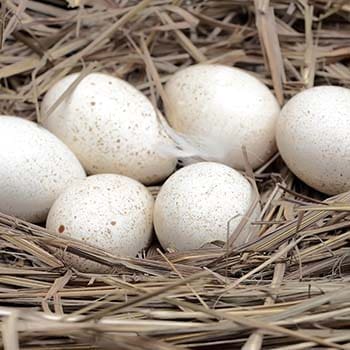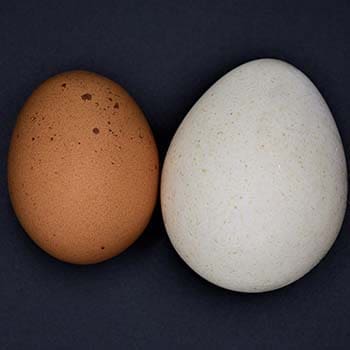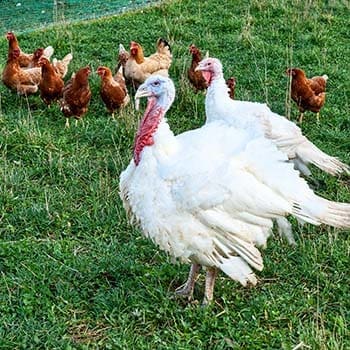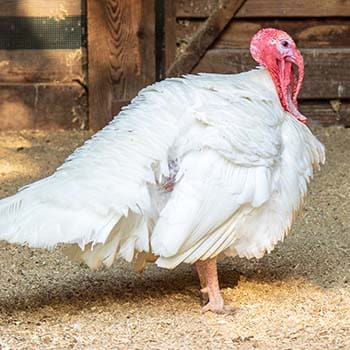Americans go crazy for eggs. Chicken eggs at least. The average Joe or Jane eats about 250 of ’em every year! There’s also a growing interest in trying other types like duck, quail, and emu eggs.
Turkey eggs? They might as well not exist. Most have likely never even seen or thought about eating a turkey egg before. Kind of crazy when you think about it. We serve up roasted turkey, turkey sandwiches, turkey jerky – you name it.
Come Thanksgiving, turkey’s the star of the show. But the eggs? Nowhere to be found. It’s like we’ve collectively forgotten they’re an option!
Are Turkey Eggs Even Safe To Eat?
Short answer – Yes! They are 100% edible. If you get your hands on some, you’re in for a real treat.
Truth be told, eggs from all kinds of birds can be super tasty and nutritious if prepared properly. And turkey eggs are no exception.
So How Do They Taste?
The taste is similar to that of chicken eggs, but even creamier and richer, thanks to the extra-large yolk.
With little seasoning and proper handling, you can turn turkey eggs into a scrumptious breakfast, dinner, snack, or baking ingredient.
However, bakers beware – the thick whites make turkey eggs a bit tricky for delicate baked goods that need a soft texture.
Like any egg, as long as you cook turkey eggs thoroughly, they make a tasty, protein-packed meal. Just avoid eating them raw or undercooked.
Why Don’t Most People Eat Turkey Eggs?
1. Turkey Eggs Are Big
I’m talking really big! We’re talking twice the size of your average chicken egg. Sure, bigger portions sound great. More egg for your buck, right? But for everyday cooking, these massive eggs actually cause some hassles.
First up – prep time. You’ll need to cook a turkey egg longer thanks to its larger size. No quick scrambled turk eggs here!
Then there’s the tough shell. Cracking into one takes serious skills – or a very sharp knife. Not ideal when you’re whipping up breakfast before work.
Storage and transportation also get tricky with such huge eggs. They need more space in the fridge and carton. And they’re way easier to crack in transit.
Bottom line – the jumbo size makes turkey eggs less convenient for most recipes or meal prepping. For everyday egg eaters, small chicken eggs win on practicality.
But if you’ve got time to spare and enjoy a challenge, turkey eggs deliver a hearty, fulfilling eating experience perfect for special occasions. Just be ready to put in a little extra work. The results are so worth it.
2. Turkeys Lay Way Fewer Eggs Than Chickens Do
Hens can pop out an egg almost daily. Turkeys? Just around two little eggs per week. Time = money for food producers. Turkeys take their sweet time maturing, not laying eggs until age 7 months versus 5 for rushin’ chickens.
Farmers ain’t got time for that! Why wait around for turkeys when chickens start popping out eggs so much faster?
3. Turkeys Are Expensive To Maintain
Raising turkeys in your homestead requires more space and food than chickens, making them pricier to produce.
With expensive production costs and low supply, turkey eggs can sell for up to $3 each – similar to two dozen regular chicken eggs.
So a fertilized turkey egg earns farmers much more than one sold to eat. That’s why it makes economic sense to breed more turkeys for meat over collecting their eggs, which brings us to our next point.
4. Farmers Bank On Turkeys For Their Tasty Meat
These big birds have been selectively bred over decades to get nice and plump for our Thanksgiving and Christmas dining tables. Not to pump out spotted brown eggs.
So while your average turkey can lay eggs almost as large as your fist, they rarely get the chance. As soon as the white and dark feathered birds reach maturity, they’re whisked off for processing.
See, those patient farmers and homesteaders have invested months feeding and housing the turkeys as they slowly grow to a profitable market weight. They’re not about to wait around for the late-laying ladies to produce scarce eggs worth little money.
It’s a lopsided equation for producers. Breed more turkeys for meat to profit from consumer demand? Or scramble to collect and sell their limited eggs for minimal returns? You can see why they stick to rearing gobblers primarily for those succulent breast cuts you’ll soon be enjoying.
5. Tradition And Familiarity
New foods freak people out, even if they’re tasty and totally safe. Turkey eggs check both boxes, but shoppers still squirm at the sight of them.
Blame tradition and familiarity. Generations of folks have grown up eating chicken eggs for breakfast.
When most buyers don’t buy, farmers stop supplying. And the cycle continues – no demand keeps turkey eggs rare. What a shame!
Preferences die hard, so don’t expect the turkey egg to overthrow the chicken egg as our breakfast staple anytime soon. Their unfamiliar look and legacy loss will keep them a novelty food.
Chicken Eggs vs Turkey Eggs
Turkey eggs differ from chicken eggs in various ways. Use the table below as a comparison between the two:
Item | Turkey Egg | Chicken Egg |
Weight | 60-110 grams | 57 grams |
Length | 65 mm | 53-59 mm |
Circumference | 5 inches | 165 mm |
Color | White with brown speckles | White or dull white |
Taste | Identical flavors! Both delicious | Identical flavors! Both delicious |
Egg Yolk Color | Deep dark yellow | Light yellow |
Annual Eggs Per Bird | Less than 100 | More than 300 |
Price Per Egg | $4-$5 each | $1.61-$2 per dozen |
Turkey Eggs Nutritional Value
Turkey eggs pack a nutritional punch far beyond their spotted shells. Check out how they compare to chicken eggs:
Nutrient | Turkey Egg | Chicken Egg |
Protein | 10.8 g | 6 g |
Fat | 9 g | 5 g |
Calories | 135 cal | 72 cal |
Vitamin A | 10% DV | 5% DV |
B Vitamins | 15% DV | 5% DV |
Vitamin E | 5% DV | 1% DV |
Iron | 18% DV (women) 41% DV (men) | 5% DV |
Selenium | 50% DV | 23% DV |
With all those extra nutrients per serving for your body and energy levels, no doubt turkey eggs kick chickens’ tail feathers nutritionally. But their slightly higher cholesterol means moderating intake if that’s a concern for your diet.
Final Thoughts
Turkey eggs lose to chickens because of the cost and familiarity. Farmers prioritize profitable meat production over sparse egg harvests from slow-growing turkeys.
Consumers stick to tried and tasted chicken eggs – wrinkling noses at the unfamiliar appearance and scarce supply of turkey eggs. Though equally edible and nutritious, turkey eggs remain a novelty.
Have you ever tried turkey eggs? If not – why? Comment below!
You may also like:
How To Store Food Without Electricity That Can Last Up To A Year (Video)














Till I read the article I was unaware that eating turkey eggs was so uncommon. True never saw them in a grocery store but living on a farm eating turkey eggs isn’t that rare (unless you don’t have any turkeys of course) same goes for goose eggs. They taste much better than chicken eggs and the yolk is almost orange. We sell the chicken eggs but eat the turkeys’. Our ducks far out produce our chickens in terms of number of eggs and they fare better in the cold. Had some guinea fowl once. We couldn’t even figure out where they were laying their eggs and their sound was annoying.
[one small note: in table 1 you have the circumference of turkey eggs in inches and chickens in millimeters which is interesting but wrong. 5″ = 127 mm which is smaller than the figure given for the chicken egg. No biggie.]